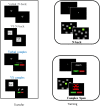Are Working Memory Training Effects Paradigm-Specific?
- PMID: 31178781
- PMCID: PMC6542987
- DOI: 10.3389/fpsyg.2019.01103
Are Working Memory Training Effects Paradigm-Specific?
Abstract
A randomized controlled trial compared complex span and n-back training regimes to investigate the generality of training benefits across materials and paradigms. The memory items and training intensities were equated across programs, providing the first like-with-like comparison of transfer in these two widely used training paradigms. The stimuli in transfer tests of verbal and visuo-spatial n-back and complex span differed from the trained tasks, but were matched across the untrained paradigms. Participants were randomly assigned to one of three training groups: complex span training, n-back training, or no training. Pre- to- post training changes were observed for untrained n-back tasks following n-back training. Following complex span training there was equivocal evidence for improvements on a verbal complex span task, but no evidence for changes on an untrained visuo-spatial complex span activity. Relative to a no intervention group, the evidence supported no change on an untrained verbal complex span task following either n-back or complex span training. Equivocal evidence was found for improvements on visuo-spatial complex span and verbal and visuo-spatial n-back tasks following both training regimes. Evidence for selective transfer (comparing the two active training groups) was only found for an untrained visuo-spatial n-back task following n-back training. There was no evidence for cross-paradigm transfer. Thus transfer is constrained by working memory paradigm and the nature of individual processes executed within complex span tasks. However, within-paradigm transfer can occur when the change is limited to stimulus category, at least for n-back.
Keywords: cognitive training; intervention; memory; transfer; working memory.
Figures


References
-
- Chooi W. T., Thompson L. A. (2012). Working memory training does not improve intelligence in healthy young adults. Intelligence 40 531–542. 10.1016/j.intell.2012.07.004 - DOI
Grants and funding
LinkOut - more resources
Full Text Sources

